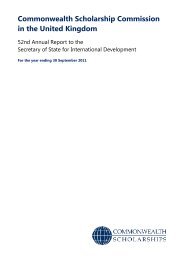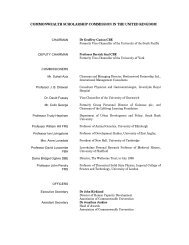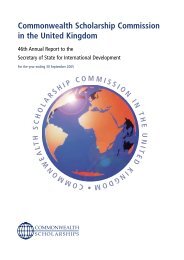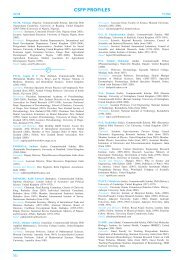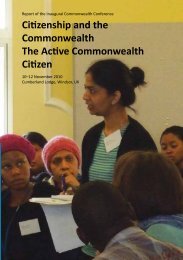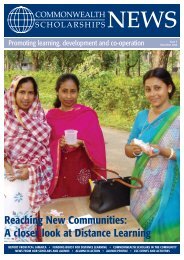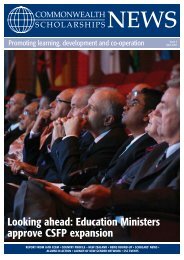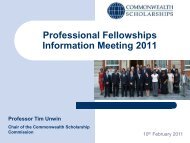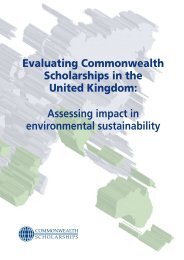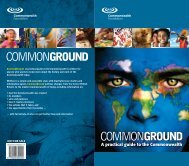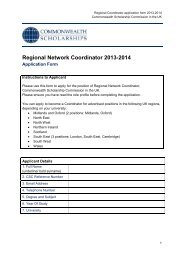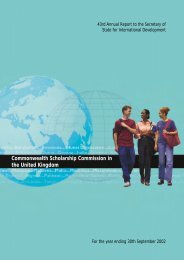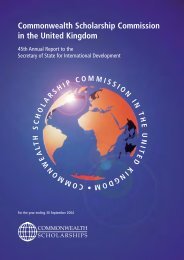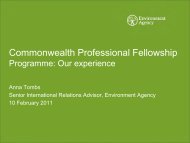Issue 5 - Commonwealth Scholarship Commission in the United ...
Issue 5 - Commonwealth Scholarship Commission in the United ...
Issue 5 - Commonwealth Scholarship Commission in the United ...
- No tags were found...
You also want an ePaper? Increase the reach of your titles
YUMPU automatically turns print PDFs into web optimized ePapers that Google loves.
NEWS ROUND-UPPrime M<strong>in</strong>isterannounces boost forUK <strong>Commonwealth</strong><strong>Scholarship</strong>sFund<strong>in</strong>g for <strong>Commonwealth</strong> <strong>Scholarship</strong>s andFellowships for develop<strong>in</strong>g <strong>Commonwealth</strong>countries will receive a significant <strong>in</strong>crease over <strong>the</strong>next three years, follow<strong>in</strong>g an announcement byGordon Brown, <strong>the</strong> British Prime M<strong>in</strong>ister, at <strong>the</strong>recent <strong>Commonwealth</strong> Heads of GovernmentMeet<strong>in</strong>g <strong>in</strong> Kampala.The Prime M<strong>in</strong>ister announced that fund<strong>in</strong>g would<strong>in</strong>crease to £50.8 million <strong>in</strong> <strong>the</strong> three years fromApril 2008, a like-for-like <strong>in</strong>crease of £6 million on<strong>the</strong> previous years. The fund<strong>in</strong>g, which will cont<strong>in</strong>ueto come from <strong>the</strong> UK Department for InternationalDevelopment (DFID), <strong>in</strong>cludes provision for a newprogramme of evaluation and cont<strong>in</strong>ues <strong>the</strong> newstrand of Distance Learn<strong>in</strong>g <strong>Scholarship</strong>s announcedby DFID <strong>in</strong> 2006.The fund<strong>in</strong>g <strong>in</strong>crease is to be phased over threeyears, with annual budgets of £15.93, £17.43 and£17.5 million respectively, which will allow <strong>the</strong><strong>Commission</strong> time to phase <strong>in</strong> new <strong>in</strong>itiatives. Whilemuch of <strong>the</strong> additional fund<strong>in</strong>g for 2008-2009 willbe used to expand exist<strong>in</strong>g programmes, a strategicplann<strong>in</strong>g exercise will take place dur<strong>in</strong>g <strong>the</strong> first sixmonths of 2008 to exam<strong>in</strong>e <strong>the</strong> wider direction ofour provision. Readers of <strong>Commonwealth</strong><strong>Scholarship</strong> News are welcome to feed <strong>the</strong>ir ownviews <strong>in</strong>to this process, and can do so by email<strong>in</strong>gcomments@cscuk.org.ukProfessor Trudy Harpham, Chair of <strong>the</strong> <strong>Commission</strong>,said that <strong>the</strong> new fund<strong>in</strong>g reflected <strong>in</strong>creasedrecognition of <strong>the</strong> role that higher education andhigh-level tra<strong>in</strong><strong>in</strong>g could play <strong>in</strong> achiev<strong>in</strong>g<strong>in</strong>ternational development objectives. She said that<strong>Commission</strong>ers were pleased that DFID had found<strong>the</strong> additional funds, which <strong>in</strong> part reflected <strong>the</strong>positive f<strong>in</strong>d<strong>in</strong>gs of an <strong>in</strong>dependent review of <strong>the</strong><strong>Commission</strong>’s work <strong>in</strong> early 2007. The fact that <strong>the</strong>fund<strong>in</strong>g had been announced by <strong>the</strong> Prime M<strong>in</strong>isterpersonally was also welcome confirmation of <strong>the</strong>wider prestige and importance of <strong>the</strong> scheme, whichit was hoped will be built on <strong>in</strong> <strong>the</strong> run up to itsfiftieth anniversary <strong>in</strong> 2009.In addition to support for <strong>Commonwealth</strong><strong>Scholarship</strong>s <strong>in</strong> develop<strong>in</strong>g countries, <strong>the</strong><strong>Commission</strong> also receives support from <strong>the</strong> UKForeign and <strong>Commonwealth</strong> Office for awards tocitizens of those <strong>Commonwealth</strong> countries that donot qualify for assistance from DFID. It has recentlybeen confirmed that this will rema<strong>in</strong> stable at £2.05million <strong>in</strong> <strong>the</strong> com<strong>in</strong>g year, reflect<strong>in</strong>g Brita<strong>in</strong>’s longstand<strong>in</strong>gcommitment that <strong>Commonwealth</strong><strong>Scholarship</strong>s should be available to citizens of allmember states.At <strong>the</strong> time of writ<strong>in</strong>g, decisions are still tak<strong>in</strong>g placeon <strong>the</strong> precise allocation of budgets for <strong>the</strong> com<strong>in</strong>gyear. A full feature on this, and <strong>the</strong> background to<strong>the</strong> fund<strong>in</strong>g <strong>in</strong>crease, will appear <strong>in</strong> <strong>the</strong> next issue.COMMONWEALTH SCHOLARSFACEBOOK GROUP<strong>Commonwealth</strong> <strong>Scholarship</strong>s are now on Facebook!Michael Griff<strong>in</strong>, a <strong>Commonwealth</strong> Scholar at <strong>the</strong>University of Oxford, has created a group on <strong>the</strong>Facebook network<strong>in</strong>g website, with news, boards,and events for <strong>Commonwealth</strong> <strong>Scholarship</strong> andFellowship holders and alumni. To jo<strong>in</strong> <strong>the</strong> group orto get more details about Facebook and register, visit<strong>the</strong> site www.facebook.com and search for‘<strong>Commonwealth</strong> Scholars’.Michael has also started an unofficial blog –‘<strong>Commonwealth</strong> Scholars Onl<strong>in</strong>e’ – <strong>in</strong>vit<strong>in</strong>gsubmissions, comments, and conversation fromcurrent and former <strong>Commonwealth</strong> Scholars andFellows <strong>in</strong> <strong>the</strong> UK and across <strong>the</strong>world. To access <strong>the</strong> blog, visithttp://commonwealthscholars.wordpress.comSuzanne Lawrence,George Curtis Memorial<strong>Commonwealth</strong> FellowCurtis established <strong>the</strong>Faculty of Law at <strong>the</strong>University of BritishColumbia (UBC) and wasone of <strong>the</strong> found<strong>in</strong>gfa<strong>the</strong>rs of <strong>the</strong><strong>Commonwealth</strong><strong>Scholarship</strong> andFellowship Plan. Suzannestudied at UBC andSimon Fraser Universityand has come toCambridge to work withDr Hilary Perraton,Deputy Chair of <strong>the</strong> <strong>Commission</strong>, on a history of <strong>the</strong>Plan. The work is based at <strong>the</strong> Von Hügel Institute ofSt Edmund’s College, Cambridge and <strong>the</strong> <strong>in</strong>tention isto produce <strong>the</strong> history <strong>in</strong> time for <strong>the</strong> Plan’s 50thanniversary <strong>in</strong> 2009.WELCOME DAY 2007Around 250 new Scholars and Fellows attended <strong>the</strong>2007 <strong>Commonwealth</strong> <strong>Scholarship</strong> <strong>Commission</strong>Welcome Programme, held at Central HallWestm<strong>in</strong>ster on 12 November. Professor MalcolmGillies, Vice-Chancellor of City University and former<strong>Commonwealth</strong> Scholar, shared his experiences <strong>in</strong>his keynote speech on ‘Brita<strong>in</strong>, education and you’.<strong>Commission</strong>ers led <strong>the</strong>med sessions <strong>in</strong> <strong>the</strong> afternoonconsider<strong>in</strong>g issues such as science and technologyrealisation and <strong>the</strong> role of universities <strong>in</strong> <strong>in</strong>ternationaldevelopment. In <strong>the</strong> even<strong>in</strong>g, a reception was hostedat <strong>the</strong> Foreign and <strong>Commonwealth</strong> Office by JimMurphy MP, M<strong>in</strong>ister for Europe andPublic Diplomacy.CURTIS FELLOW APPOINTMENTSuzanne Lawrence has arrived <strong>in</strong> <strong>the</strong> UK fromCanada on an 18-month assignment as <strong>the</strong> GeorgeCurtis Memorial <strong>Commonwealth</strong> Fellow. GeorgeProfessor Trudy Harpham, Chair of <strong>the</strong><strong>Commission</strong>, Jim Murphy, FCO M<strong>in</strong>ister, andScholars at <strong>the</strong> 2007 Welcome Day receptionJanuary 2008 3
SCHOLARS’ NEWSThe fields of science and technology are becom<strong>in</strong>g <strong>in</strong>creas<strong>in</strong>gly important as <strong>the</strong> need for significant new research to help turn exist<strong>in</strong>g knowledge<strong>in</strong>to practical solutions becomes ever greater. Science and technology help to facilitate research <strong>in</strong> many subject areas, <strong>in</strong>clud<strong>in</strong>g agriculture, healthand <strong>the</strong> environment. Here, some of our <strong>Commonwealth</strong> Scholars describe <strong>the</strong> work <strong>the</strong>y are do<strong>in</strong>g and <strong>the</strong> impact <strong>the</strong>y hope it will have <strong>in</strong> <strong>the</strong>irhome countries.IMPROVING ANIMAL FOOD SAFETYAziwo Niba, a <strong>Commonwealth</strong> Scholar based at <strong>the</strong>University of Plymouth, is enter<strong>in</strong>g <strong>in</strong>to <strong>the</strong> third yearof his PhD <strong>in</strong> ‘Fermented feed technology as ameans of improv<strong>in</strong>g animal food safety <strong>in</strong>develop<strong>in</strong>g country animal agriculture’. This topic isparticularly pert<strong>in</strong>ent for Aziwo’s native Cameroon,which is heavily dependent on its agricultural sector.‘For animal agriculture <strong>in</strong> develop<strong>in</strong>g countries, <strong>the</strong>implications offermented feedtechnology as ameans of improv<strong>in</strong>ganimal food safety areonly too obvious. It isbiologically safe andsimple to adopt, can fit<strong>in</strong>to <strong>the</strong> small-scaleAziwo Niba,<strong>Commonwealth</strong> Scholarfrom Cameroonanimal productionprevalent <strong>in</strong> sucheconomies and moreimportantly it isaffordable.’ Upon hisreturn to Cameroon,Aziwo will be heavily<strong>in</strong>volved <strong>in</strong> capacity build<strong>in</strong>g and tra<strong>in</strong><strong>in</strong>g at <strong>the</strong>University of Dschang. He hopes to improve publicawareness of science by help<strong>in</strong>g target groups tounderstand <strong>the</strong> scientific basis of food safety, healthyanimal foods and production methods. Aziwowishes to focus on <strong>the</strong> ever-<strong>in</strong>creas<strong>in</strong>g ‘need forbridg<strong>in</strong>g <strong>the</strong> knowledge gap as one of <strong>the</strong> keyvariables underp<strong>in</strong>n<strong>in</strong>g human health anddevelopment. Obviously, form<strong>in</strong>g a network ofstakeholders who can effectively reflect on ways andmeans of communicat<strong>in</strong>g health-promot<strong>in</strong>gagricultural science and products to <strong>the</strong> public <strong>in</strong> away that will be understood and appreciated will bevery vital to this goal’.INTERNET TOOLS TO HELP CONTROLINFECTIOUS DISEASESCanadian <strong>Commonwealth</strong> Scholar Andrea Wang iscurrently work<strong>in</strong>g towards a DPhil <strong>in</strong> InternationalRelations at <strong>the</strong> University of Oxford, with a focus on<strong>the</strong> role of <strong>in</strong>ternet monitor<strong>in</strong>g technologies <strong>in</strong>relation to <strong>the</strong> International Health Regulations(IHR), a legally b<strong>in</strong>d<strong>in</strong>g set of rules govern<strong>in</strong>g <strong>the</strong><strong>in</strong>ternational community’s efforts to control <strong>the</strong>spread of <strong>in</strong>fectious diseases. Andrea has beenexam<strong>in</strong><strong>in</strong>g <strong>the</strong> role of <strong>the</strong> World Health Organisation(WHO), which has developed <strong>in</strong>novative <strong>in</strong>ternettools that have fundamentally changed <strong>in</strong>ternationaldisease surveillance. Two such mechanisms are <strong>the</strong>Program for Monitor<strong>in</strong>g Emerg<strong>in</strong>g Diseases(ProMED-mail), which enables people to exchange<strong>in</strong>formation about outbreaks of <strong>in</strong>fectious disease,and <strong>the</strong> Global Public Health Information Network(GPHIN), which detects early warn<strong>in</strong>gs of diseaseoutbreaks by monitor<strong>in</strong>g, filter<strong>in</strong>g and publish<strong>in</strong>grelevant items fromglobal mediasources on asystem accessibleto fee-pay<strong>in</strong>gorganisations withan establishedpublic healthAndrea Wang,mandate. ‘Thesenew technologiessignificantlyreduced <strong>the</strong> time ittook for disease<strong>Commonwealth</strong> Scholar outbreaks tofrom Canadabecome publicknowledge, andmade it virtually impossible for governments to hideserious outbreaks with<strong>in</strong> <strong>the</strong>ir borders. Such changeswere critical <strong>in</strong> push<strong>in</strong>g forward <strong>the</strong> process ofrevis<strong>in</strong>g <strong>the</strong> IHR.’IMPROVING BIOLOGICAL RESEARCHLiz New, a Chemistry PhD <strong>Commonwealth</strong> Scholarat <strong>the</strong> University of Durham, is work<strong>in</strong>g with hersupervisor, Professor David Parker, on a project<strong>in</strong>vestigat<strong>in</strong>g lanthanide complexes as probes ofcellular activity. ‘The progress of biological researchrequires more sophisticated techniques for study<strong>in</strong>gcells. My research group uses lanthanide metalcomplexes which arelum<strong>in</strong>escent – <strong>the</strong>yemit light. When welook under afluorescencemicroscope at cellstreated with <strong>the</strong>sechemicals, we can see<strong>the</strong>ir lum<strong>in</strong>escence.’Liz hopes to makeLiz New, <strong>Commonwealth</strong>some importantScholar from Australiadiscoveries through<strong>the</strong> project, which is‘focussed on ga<strong>in</strong><strong>in</strong>g an understand<strong>in</strong>g of <strong>the</strong> ways<strong>in</strong> which <strong>the</strong>se complexes <strong>in</strong>teract with cells; forexample, how <strong>the</strong>y enter cells and move to variouscellular locations. This should assist <strong>in</strong> design<strong>in</strong>gchemicals with useful properties and applications’. Inaddition to her work at Durham, Liz has been able tofur<strong>the</strong>r her knowledge of <strong>the</strong> <strong>in</strong>teraction of metalcomplexes with cells by attend<strong>in</strong>g variousconferences, such as <strong>the</strong> International Conferenceon Biological Inorganic Chemistry <strong>in</strong> Vienna <strong>in</strong> July2007, present<strong>in</strong>g a poster at <strong>the</strong> RSC Metals <strong>in</strong>Medic<strong>in</strong>e conference <strong>in</strong> Durham <strong>in</strong> September 2007,and contribut<strong>in</strong>g to two papers which werepublished <strong>in</strong> Organic and Biomolecular Chemistrythis year. In <strong>the</strong> future, Liz hopes to work <strong>in</strong>academia, cont<strong>in</strong>u<strong>in</strong>g with research <strong>in</strong> biologicalchemistry; as a second year PhD student, she isexcited about <strong>the</strong> challenges ahead: ‘I look forwardto <strong>the</strong> com<strong>in</strong>g two years – and hopefully f<strong>in</strong>d<strong>in</strong>gsome answers to my questions!’LEADING THE WAY IN BIOMEDICINEHav<strong>in</strong>g ga<strong>in</strong>ed degrees <strong>in</strong> medic<strong>in</strong>e, humangenetics, applied ma<strong>the</strong>matics and computationalbiology, <strong>Commonwealth</strong> Scholar Qu<strong>in</strong> Wills decidedto comb<strong>in</strong>e his areas of expertise when embark<strong>in</strong>gupon his doctoral research. He is currently work<strong>in</strong>gwith <strong>the</strong> Ma<strong>the</strong>matical Genetics and Bio<strong>in</strong>formaticsgroup at <strong>the</strong> University of Oxford, to ‘better modeltype 2 diabetes risk us<strong>in</strong>g genomics, transcriptomics,proteomics and metabonomics (gene, prote<strong>in</strong> andmetabolic data)’, us<strong>in</strong>g ‘data derived from <strong>the</strong> largestsuch study done todate’. In l<strong>in</strong>e with hisacademic <strong>in</strong>terests,Qu<strong>in</strong> co-founded aDTI-fundedbiotechnologycompany which usesgene expressionmodels developedfrom human cellQu<strong>in</strong> Wills,cultures as<strong>Commonwealth</strong> Scholarfrom South Africaalternatives to animaltoxicity test<strong>in</strong>g, <strong>the</strong>impact of whichcould hugely decrease <strong>the</strong> cost of drugdevelopment. Qu<strong>in</strong> is grateful for <strong>the</strong> opportunitiesafforded to him by his <strong>Commonwealth</strong> <strong>Scholarship</strong>and, upon his return to South Africa, he hopes to bepart of a world-class centre of excellence <strong>in</strong> <strong>the</strong> studyof complex biomedic<strong>in</strong>e, participate <strong>in</strong> <strong>the</strong> SouthAfrican government’s current strategy of <strong>in</strong>fus<strong>in</strong>gmoney <strong>in</strong>to <strong>the</strong> biotechnology sector and improve<strong>in</strong>ternational collaboration at an <strong>in</strong>dustrial andacademic level. ‘I see no reason why South Africacannot have a reputation for lead<strong>in</strong>g biomedic<strong>in</strong>e,and would like to be a part of it.’You can send your feedback, news and viewsfor <strong>in</strong>clusion <strong>in</strong> <strong>Commonwealth</strong> <strong>Scholarship</strong>sNews by email: comments@cscuk.org.uk4 <strong>Commonwealth</strong> <strong>Scholarship</strong>s News
IN YOUR OWN WORDSTHE VALUE OF GEOGRAPHICAL INFORMATION SYSTEM(GIS) FOR HIV/AIDS SURVEILLANCEPeter Adebayo Idowu (<strong>Commonwealth</strong> Academic Staff Scholar,PhD <strong>in</strong> Computer Science, Aston University) describes <strong>the</strong>motivations for his research <strong>in</strong>to <strong>the</strong> topical issue of GIS fordisease monitor<strong>in</strong>g and <strong>the</strong> impact this will have on his homecountry, Nigeria.The advent of <strong>in</strong>formation technology has changed almosteveryth<strong>in</strong>g we do <strong>in</strong> life. A Geographical Information System (GIS)is a computer-based <strong>in</strong>formation system that is used to capture,model, store, retrieve, share, process, manipulate, analyse andpresent geospatial data for <strong>the</strong> purpose of decision-mak<strong>in</strong>g. GIS is apowerful tool <strong>in</strong> <strong>the</strong> management of geospatial referenced data andit has become a more common part of everyday life which is of<strong>in</strong>terest to almost everybody – bus<strong>in</strong>essmen, eng<strong>in</strong>eers, governmentofficers, and public health officers. GIS has been used by publichealth officers <strong>in</strong> developed nations (Europe, <strong>the</strong> <strong>United</strong> States andCanada) for disease surveillance, analysis, monitor<strong>in</strong>g, and modell<strong>in</strong>g, butAfrica, which has high <strong>in</strong>cidences of AIDS, malaria, and tuberculosis, has yet toemploy GIS widely <strong>in</strong> <strong>the</strong> public health sector.AIDS has become one of <strong>the</strong> most destructive epidemics both <strong>in</strong> developed anddevelop<strong>in</strong>g nations. Public health researchers, especially epidemiologists, arecurrently battl<strong>in</strong>g with this deadlydisease. Sub-Saharan Africa is oneof <strong>the</strong> most affected regions <strong>in</strong> <strong>the</strong>world; however, computer-based<strong>in</strong>formation systems are notcurrently used across <strong>the</strong> regionfor controll<strong>in</strong>g, monitor<strong>in</strong>g andmanagement of this epidemic.I was fortunate to be awarded a<strong>Commonwealth</strong> <strong>Scholarship</strong>, which hasgiven me this opportunity to researchand undergo academic tra<strong>in</strong><strong>in</strong>g at aworld class university under <strong>the</strong>supervision of experts <strong>in</strong> computerscience, GIS and statistics.My impetus for this researchorig<strong>in</strong>ated from a conference Iattended sometime ago, whereone of <strong>the</strong> presenters gave astatistical analysis of HIV/AIDSglobally and <strong>in</strong> my country,Nigeria. A few months later, I was watch<strong>in</strong>g a programme on a populartelevision station <strong>in</strong> my country when <strong>the</strong> chairman of <strong>the</strong> National Agency for<strong>the</strong> Control of AIDS (NACA) talked about AIDS. S<strong>in</strong>ce that time I have beenth<strong>in</strong>k<strong>in</strong>g about how <strong>in</strong>formation technology can be used to manage, monitorand control <strong>the</strong> spread of this epidemic. Eventually, I came up with <strong>the</strong> idea ofa web-based GIS capable system for HIV/AIDS epidemiological surveillance,which I am research<strong>in</strong>g as my PhD topic.As I was search<strong>in</strong>g and review<strong>in</strong>g literature <strong>in</strong> order to def<strong>in</strong>e <strong>the</strong> state of <strong>the</strong> art<strong>in</strong> <strong>the</strong> area of disease surveillance and modell<strong>in</strong>g, I was fortunate to be awardeda <strong>Commonwealth</strong> <strong>Scholarship</strong>, which has given me this opportunity to researchand undergo academic tra<strong>in</strong><strong>in</strong>g at a world class university under <strong>the</strong> supervisionof experts <strong>in</strong> computer science, GIS and statistics.My research focuses on develop<strong>in</strong>g a web-based GIS epidemiologicalsurveillance for monitor<strong>in</strong>g, controll<strong>in</strong>g and management of HIV/AIDS. One of<strong>the</strong> aims of this research is to develop a GIS web service which will allow<strong>in</strong>teroperability with o<strong>the</strong>r systems and <strong>in</strong>cludes a novel <strong>in</strong>built forecast<strong>in</strong>gcapacity. The system will be able to capture, analyse, manipulate and presentgeospatial referenced HIV/AIDS data for <strong>the</strong> purpose of monitor<strong>in</strong>g andmanag<strong>in</strong>g HIV/AIDS. When fully implemented, <strong>the</strong> system will assist authorisedPeter Idowu, <strong>Commonwealth</strong> Academic Staff Scholar from Nigeriapolicymakers, government representatives and stakeholders <strong>in</strong> visualis<strong>in</strong>g,analys<strong>in</strong>g, and forecast<strong>in</strong>g <strong>the</strong> state of HIV/AIDS <strong>in</strong> any state <strong>in</strong> Nigeria. Due tosome of <strong>the</strong> problems fac<strong>in</strong>g develop<strong>in</strong>g nations (most especially sub-SaharanAfrica) <strong>in</strong> <strong>the</strong> deployment of ICT <strong>in</strong> <strong>the</strong> health sector, open source software willbe used to m<strong>in</strong>imise <strong>the</strong> cost of us<strong>in</strong>g <strong>the</strong> application. A particular challenge thatneeds to be addressed is how <strong>the</strong> design of <strong>the</strong> system can be optimised toensure take-up <strong>in</strong> Nigeria.I am sure that <strong>the</strong> result of this research will bea useful tool <strong>in</strong> <strong>the</strong> fight aga<strong>in</strong>st HIV/AIDS <strong>in</strong>Nigeria, sub-Saharan Africa and Africa as awhole. With <strong>the</strong> application that will come outof this research, electronic monitor<strong>in</strong>g andmanagement of HIV/AIDS will be possible andHIV/AIDS data will be easily available, storedand ma<strong>in</strong>ta<strong>in</strong>ed for research, public enquiriesand decision-mak<strong>in</strong>g. After <strong>the</strong> completion ofmy PhD, I hope to get a postdoctoral positionto broaden my skills and knowledge <strong>in</strong> <strong>the</strong>fields of GIS, comput<strong>in</strong>g and health<strong>in</strong>formatics.Have you jo<strong>in</strong>ed one of our Professional Networks yet?So far we have launched six Networks, <strong>in</strong> <strong>the</strong> follow<strong>in</strong>g areas:• Gender• Health• Education• Governance, Civil Society and Community Development• Environment• Agriculture/Rural DevelopmentOur seventh Network on Science and Technology has just beenlaunched (see page 10). We have forthcom<strong>in</strong>g Networks planned on:• Infrastructure and Urban Development• Legal/Human Rights and Conflict Resolution• Management, Communications and Bus<strong>in</strong>ess• Economics and Public F<strong>in</strong>anceTo sign up to any of <strong>the</strong> Professional Networks, visitwww.cscuk.org.uk/news/csc_prof_networks.aspJanuary 20085
COMMONWEALTH COLLABORATIONSFOR SCIENTIFIC EXCELLENCEThe benefits of science and technology are well documented. Dr Monica Darnbrough CBE,<strong>Commonwealth</strong> <strong>Scholarship</strong> <strong>Commission</strong>er, considers <strong>the</strong> role that <strong>Commonwealth</strong><strong>Scholarship</strong>s have to play.All countries need science, and everyone benefits from itsapplications <strong>in</strong> medic<strong>in</strong>e, agriculture and through technology andeng<strong>in</strong>eer<strong>in</strong>g. However, no <strong>in</strong>dividual country can afford to carry outall <strong>the</strong> scientific research it would like to do, so it is a field <strong>in</strong> which<strong>in</strong>ternational collaboration is natural and necessary.In <strong>the</strong> UK we have a big science community but we carry out only 5% of<strong>the</strong> world’s research. Many countries are <strong>in</strong>vest<strong>in</strong>g <strong>in</strong> new laboratories andscience parks and <strong>in</strong> tra<strong>in</strong><strong>in</strong>g more scientists and eng<strong>in</strong>eers. I have seen,first hand, fantastic facilities for bioscience research <strong>in</strong> India, S<strong>in</strong>gapore,Canada and Australia and I know that <strong>the</strong>re are many projects, <strong>the</strong>re andelsewhere, <strong>in</strong> which British scientists are work<strong>in</strong>g with colleagues overseas.The UK Medical Research Council with <strong>the</strong> Department for InternationalDevelopment runs a laboratory <strong>in</strong> Gambia – a centre of excellence <strong>in</strong>Africa work<strong>in</strong>g on HIV, TB and malaria research. The Royal Society ofChemistry is just sett<strong>in</strong>g up a pan-Africa chemistry network, start<strong>in</strong>g <strong>in</strong>Kenya, to provide teachers and researchers with access to research reportsand data.While <strong>the</strong>re is competition between teams of scientists to be <strong>the</strong> first to makediscoveries, <strong>the</strong>re is collaboration too between research teams who are work<strong>in</strong>g <strong>in</strong><strong>the</strong> same field, and <strong>the</strong>y share experiences and techniques. Some countries havejo<strong>in</strong>ed toge<strong>the</strong>r to share enormous, expensive scientific equipment like telescopesand <strong>the</strong> accelerators used to explore <strong>the</strong> fundamental particles that make upatoms.Scientists read about <strong>the</strong> work of researchers <strong>in</strong> o<strong>the</strong>r countries <strong>in</strong> scientific journals– some of which now cover very narrow specialisms. The availability of journals <strong>in</strong>libraries has been vital but we are now beg<strong>in</strong>n<strong>in</strong>g to use onl<strong>in</strong>e journals. Noth<strong>in</strong>gbeats <strong>the</strong> opportunity to talk with o<strong>the</strong>r researchers who you know well.<strong>Commonwealth</strong> Scholars keep <strong>in</strong> touch with people <strong>the</strong>y have met while study<strong>in</strong>g.It can be so helpful to talk to someone else who uses <strong>the</strong> same equipment orresearch methods when someth<strong>in</strong>g odd is happen<strong>in</strong>g <strong>in</strong> your own laboratory. Ihope that <strong>the</strong> new Science and Technology Network we are launch<strong>in</strong>g will enable<strong>Commonwealth</strong> Scholars to f<strong>in</strong>d contacts who can help <strong>the</strong>m. I also hope that <strong>the</strong>Network will stimulate new ideas – I would love to see some collaborative researchcome about as a result of contacts made through <strong>the</strong> Network.The benefits of scientific research range from electricity to medic<strong>in</strong>es, fromaeroplanes to anaes<strong>the</strong>tics, from pesticides to computers. Life expectancy<strong>in</strong> England <strong>in</strong>creased when scientists understood how diseases came frombacteria <strong>in</strong> dirty water and that hygiene improved when clean water wasmade available. I believe clean water should be available throughout <strong>the</strong>world, for everyone, with <strong>the</strong> help of hydrologists and eng<strong>in</strong>eers – andpoliticians. Technologists and eng<strong>in</strong>eers br<strong>in</strong>g us <strong>the</strong> equipment and<strong>in</strong>frastructure we need – from water pumps and power stations to damsand bridges. Medic<strong>in</strong>es and vacc<strong>in</strong>es have fur<strong>the</strong>r <strong>in</strong>creased life expectancy– but public health improvements have had <strong>the</strong> greatest effect. Publichealth was <strong>the</strong> subject of our September issue and <strong>the</strong>re is already aNetwork for scholars work<strong>in</strong>g <strong>in</strong> that field. Some scientists may also be<strong>in</strong>terested <strong>in</strong> jo<strong>in</strong><strong>in</strong>g our Professional Networks on agriculture,environment, health or gender, depend<strong>in</strong>g on <strong>the</strong> fields <strong>the</strong>y are nowwork<strong>in</strong>g <strong>in</strong>.There are <strong>in</strong>equalities between countries <strong>in</strong> terms of facilities for research<strong>in</strong> different discipl<strong>in</strong>es and <strong>in</strong> <strong>the</strong> numbers of qualified scientists.<strong>Commonwealth</strong> <strong>Scholarship</strong>s enable some scientists to come to <strong>the</strong> UK toundertake a Master’s course or to carry out orig<strong>in</strong>al research for a PhD.6 <strong>Commonwealth</strong> <strong>Scholarship</strong>s News
SCIDEV.NET –A S&T RESOURCESome will be able to use analytical and o<strong>the</strong>requipment which is not available <strong>in</strong> <strong>the</strong>ir owncountries – access to equipment is a valuableaspect of split-site awards. We hope that scholarswill go back to streng<strong>the</strong>n colleges anduniversities <strong>in</strong> <strong>the</strong>ir own countries and that <strong>the</strong>irexperience <strong>in</strong> <strong>the</strong> UK will add to <strong>the</strong>ir enthusiasmfor science which <strong>the</strong>y will pass on to youngpeople. O<strong>the</strong>rs may be entrepreneurs who buildbus<strong>in</strong>esses on science or technology and go onto create jobs for o<strong>the</strong>r people.Scientific advances and novel researchtechniques frequently raise ethical and socialquestions. The use of scientific knowledge br<strong>in</strong>gswith it huge responsibilities for <strong>in</strong>dividualresearchers, for companies and for society. Wecan all rejoice when we see science andtechnology used <strong>in</strong> life-sav<strong>in</strong>g medical advancesor to <strong>in</strong>crease crop yields. However, <strong>the</strong>re arealso risks associated with science and technology.The debate about <strong>the</strong> pros and cons of us<strong>in</strong>ggenetically modified plants still cont<strong>in</strong>ues – eventhough <strong>the</strong>re are some very positive case studieswhere we can see real societal and economicbenefits <strong>in</strong> communities who no longer have touse toxic sprays, where women are freed to domore profitable work and children can go toschool <strong>in</strong>stead of work<strong>in</strong>g <strong>in</strong> <strong>the</strong> fields. Ref<strong>in</strong>eriesand factories which make plastics, fertilisers,pesticides and o<strong>the</strong>r products need carefuldesign and must have built-<strong>in</strong> safety devices.Managers and staff must have a safety culturewhich requires genu<strong>in</strong>e understand<strong>in</strong>g of <strong>the</strong>processes and procedures and extensive tra<strong>in</strong><strong>in</strong>g.Unfortunately, some examples have madepeople th<strong>in</strong>k of science and technology asdangerous and harmful ra<strong>the</strong>r than beneficial.Regrettably, not all companies have given highpriority to safety or environmental issues. Myheart breaks when I hear about <strong>the</strong> long-termsuffer<strong>in</strong>g of those affected by disasters like that ofUnion Carbide (now Dow) at Bhopal <strong>in</strong> India. Butlessons have been learned and companies nowtake safety and environmental issues seriously.It is always excit<strong>in</strong>g to read <strong>the</strong> application formsfor scientific studies from prospective<strong>Commonwealth</strong> Scholars and to hear aboutresearch projects from Scholars at <strong>the</strong> WelcomeDay. The <strong>Commission</strong>ers are keen to ensure that<strong>the</strong> quality of science and eng<strong>in</strong>eer<strong>in</strong>gapplications <strong>in</strong> all discipl<strong>in</strong>es rema<strong>in</strong>s highbecause science and technology can contributeso much to health, agriculture, <strong>the</strong> environmentand wealth generation <strong>in</strong> all <strong>Commonwealth</strong>countries.Readers might be <strong>in</strong>terested to know of a freeonl<strong>in</strong>e science resource - SciDev.Net. SciDev.Net(<strong>the</strong> Science and Development Network) was setup <strong>in</strong> 2001 with <strong>the</strong> support of <strong>the</strong> sciencejournals Nature and Science, as well as <strong>the</strong>Academy of Science of <strong>the</strong> Develop<strong>in</strong>g World(TWAS). It provides news, views and <strong>in</strong>formationabout science, technology and <strong>the</strong> develop<strong>in</strong>gworld, and has a circulation of around 5,000<strong>in</strong>dividuals throughout <strong>the</strong> <strong>Commonwealth</strong>, andmostly <strong>in</strong> develop<strong>in</strong>g countries.The past few years have seen renewed <strong>in</strong>terest <strong>in</strong><strong>the</strong> role of science and technology <strong>in</strong> help<strong>in</strong>gdevelop<strong>in</strong>g countries achieve susta<strong>in</strong>ableeconomic growth. To achieve this potential,however, policymakers – at all levels of society –need accurate and reliable <strong>in</strong>formation abouthow science and technology can help to meet<strong>the</strong>ir objectives.At <strong>the</strong> same time, broad public understand<strong>in</strong>gand engagement is required to ensure open anddemocratic debate about <strong>the</strong> best way ofachiev<strong>in</strong>g <strong>the</strong> promises of science andtechnology, and handl<strong>in</strong>g <strong>the</strong>ir potentiallynegative consequences.SciDev.Net addresses <strong>the</strong>se needs primarilythrough www.scidev.net, its free-access websitewhich conta<strong>in</strong>s news, views and analysis aboutscience and technology <strong>in</strong> <strong>the</strong> develop<strong>in</strong>g world,much of it written by members of a wide networkof professional science journalists and o<strong>the</strong>rcontributors from <strong>the</strong>se regions.The website aims to meet <strong>the</strong> <strong>in</strong>formation needs,around <strong>the</strong> <strong>in</strong>terface between science and publicpolicy, of a wide range of readers, <strong>in</strong>clud<strong>in</strong>gresearchers, policy analysts, government officials,journalists and those work<strong>in</strong>g for both aidagencies and non-governmental organisations.Its content is divided <strong>in</strong>to a number of regionalgateways, each gateway cover<strong>in</strong>g a particularpart of <strong>the</strong> develop<strong>in</strong>g world. In addition,<strong>in</strong>dividual topics, rang<strong>in</strong>g from climate change to<strong>in</strong>tellectual property rights, are given <strong>in</strong>-depthcoverage that <strong>in</strong>cludes op<strong>in</strong>ion articles fromexpert authorities, background brief<strong>in</strong>g papers,and l<strong>in</strong>ks to key documents giv<strong>in</strong>g <strong>the</strong> scientificbasis of <strong>the</strong> issue be<strong>in</strong>g addressed.SciDev.Net is also directly engaged directly <strong>in</strong>enhanc<strong>in</strong>g <strong>the</strong> capacity of science communicatorsand o<strong>the</strong>rs (<strong>in</strong>clud<strong>in</strong>g researchers) to providereliable and authoritative <strong>in</strong>formation on suchissues by organis<strong>in</strong>g regional workshops,<strong>in</strong>ternships <strong>in</strong> its London office, and o<strong>the</strong>ractivities.SciDev.Net is a not-for-profit company andregistered educational charity <strong>in</strong> <strong>the</strong> UK. Toreceive a free weekly email alert list<strong>in</strong>g <strong>the</strong> latestpost<strong>in</strong>gs on <strong>the</strong> website, available <strong>in</strong> a choice offour languages, or to post notices about jobs,events, grants and announcements distributed toover 30,000 users worldwide every week,Scholars and alumni should visit <strong>the</strong> SciDev.Netwebsite directly at www.scidev.net/sign-upMun-Keat Looi,SciDev.Net's news editor,and Talent N'gandwe,Zambian sciencejournalistJanuary 2008 7
ALUMNI IN ACTIONAlumni NewsFURTHER STUDY IN REDUCINGINDUSTRIAL WASTEClement Musa Gonah was awarded a<strong>Commonwealth</strong> <strong>Scholarship</strong> to study MSc CeramicScience and Eng<strong>in</strong>eer<strong>in</strong>g at <strong>the</strong> University ofSheffield <strong>in</strong> 2003. On return<strong>in</strong>g to Nigeria, heheaded <strong>the</strong> glassClement Gonah,<strong>Commonwealth</strong> alumnus,work<strong>in</strong>g on <strong>the</strong> mach<strong>in</strong>e thatearned him his Merit Awardtechnology work<strong>in</strong> <strong>the</strong>Department ofIndustrial Designat Ahmadu BelloUniversity, andwas awarded <strong>the</strong>Kaduna StateGovernment’sMerit Award <strong>in</strong>October 2005 fora research projecton <strong>the</strong> design andfabrication of amach<strong>in</strong>e for glasswaste process<strong>in</strong>g.The project aimed to curb waste result<strong>in</strong>g from glassmaterials. Currently, Clement is undertak<strong>in</strong>g a PhD<strong>in</strong> Chemical Eng<strong>in</strong>eer<strong>in</strong>g at Ahmadu Bello University<strong>in</strong> Nigeria, work<strong>in</strong>g on <strong>the</strong> use of composite cementsystems for res<strong>in</strong>s waste immobilisation. In thisresearch, at <strong>the</strong> Centre for Energy, Research andTra<strong>in</strong><strong>in</strong>g, he is apply<strong>in</strong>g skills and knowledge ga<strong>in</strong>edfrom his time on award at <strong>the</strong> University of Sheffield.THE FUTURE OF COAL IN BANGLADESHProfessor Rafiqul Islam held a <strong>Commonwealth</strong>Fellowship at <strong>the</strong> School of Chemical, Environmentaland M<strong>in</strong><strong>in</strong>g Eng<strong>in</strong>eer<strong>in</strong>g at <strong>the</strong> University ofNott<strong>in</strong>gham <strong>in</strong> 2005-2006, and carried out researchon <strong>the</strong> utilisation of coal and environmental issues.This is a very relevant issue <strong>in</strong> Bangladesh, due to <strong>the</strong>recent discovery of fur<strong>the</strong>r coal resources. ProfessorIslam also worked on CO2 sequestration <strong>in</strong> clean coaltechnology, which would reduce coal’s contributionto global warm<strong>in</strong>g. He has now returned to his workProfessor Rafiqul Islam, former <strong>Commonwealth</strong>Fellow, with Professor Sir Col<strong>in</strong> Campbell,Vice-Chancellor of <strong>the</strong> University of Nott<strong>in</strong>ghamas Professor and Chairman of <strong>the</strong> Department ofApplied Chemistry and Chemical Technology at <strong>the</strong>University of Dhaka, but is confident that <strong>the</strong> work heundertook will lead to future collaborative work ofbenefit to Bangladesh and beyond. Professor Islamhas also recently appeared <strong>in</strong> <strong>the</strong> US Who’s Who <strong>in</strong>Science and Eng<strong>in</strong>eer<strong>in</strong>g.ALUMNUS CONDUCTING LIVER DISEASERESEARCHDr Brij K Sharma (<strong>Commonwealth</strong> Fellow, Dept ofMedic<strong>in</strong>e, Centre for Hepatology, Royal FreeHospital School of Medic<strong>in</strong>e, 2003-2004) is Head of<strong>the</strong> Department of Zoology at RL SahariaGovernment PG College, India. He is currentlyspend<strong>in</strong>g a year <strong>in</strong> <strong>the</strong> UK as a Royal Society Fellowat <strong>the</strong> Wolfson Centre for Stem Cells, TissueEng<strong>in</strong>eer<strong>in</strong>g and Modell<strong>in</strong>g (STEM) at <strong>the</strong> Universityof Nott<strong>in</strong>gham’s Centre for Biomolecular Science.This research is expected to make a significantcontribution to <strong>the</strong> field of liver tissue eng<strong>in</strong>eer<strong>in</strong>g,bio-artificial liver andsubsequent use ofhepatocytes (livercells) for cell <strong>the</strong>rapy<strong>in</strong> various chronicliver diseases. DrSharma was also <strong>the</strong>organis<strong>in</strong>g secretaryof a nationalconference on‘Conservation andDr Brij K Sharma,<strong>Commonwealth</strong> alumnusManagement ofFaunal Diversity ofRajasthan’, held <strong>in</strong>2006 at <strong>the</strong>University of Rajasthan, India under <strong>the</strong> auspices of<strong>the</strong> Department of Zoology at <strong>the</strong> University ofRajasthan, <strong>the</strong> Department of Higher Education and<strong>the</strong> Department of Science and Technology of <strong>the</strong>Government of Rajasthan, and <strong>the</strong> Eco-EthicsInternational Union (EEIU), GermanyRESEARCHING APPLICATIONS OFTECHNOLOGYProfessor Abhijit Mukherji (<strong>Commonwealth</strong> Scholar,PhD <strong>in</strong> Biochemical Eng<strong>in</strong>eer<strong>in</strong>g, University ofSouthampton, 1975-1979) has over 20 yearsexperience of many varied projects, <strong>in</strong>clud<strong>in</strong>g<strong>in</strong>dustrial control systems and medical electronics,research and development of specialised electromedical<strong>in</strong>strumentation design and computerbaseddiagnosis, computerisation and network<strong>in</strong>g <strong>in</strong>hospital projects, telemedic<strong>in</strong>e, e-health, and e-commerce security. Professor Mukherji’s particularareas of <strong>in</strong>terest and research <strong>in</strong>clude cyberneticsand man-mach<strong>in</strong>e <strong>in</strong>teraction, speech analysis <strong>in</strong>Indian languages, applications <strong>in</strong> biometrics forspeaker identification and speech-to-textconversions, communication and controlapplications for disabled people, and alternativetechnologies. He is f<strong>in</strong>alis<strong>in</strong>g a collaborative projecton fuel cell-powered electric vehicles with <strong>the</strong>Central Mechanical Eng<strong>in</strong>eer<strong>in</strong>g Research Institute <strong>in</strong>Durgapur, India, as well as study<strong>in</strong>g technological<strong>in</strong>novations for <strong>in</strong>telligent smart-card readers formedical, commercial and civilian applications. Atpresent, he is a Life Member of <strong>the</strong> BiomedicalEng<strong>in</strong>eer<strong>in</strong>g Society of India, Institutional Member of<strong>the</strong> Computer Society of India, Member of <strong>the</strong> Boardof Studies of St Xavier’s College, Kolkata, andPresident of <strong>the</strong> Bharat Vikash Parishad (IndiaDevelopment Society), Durgapur.In BriefAWARDS AND CAREER ANNOUNCEMENTSDr Pramod Godbole (<strong>Commonwealth</strong> Scholar, PhD<strong>in</strong> Civil Eng<strong>in</strong>eer<strong>in</strong>g, University of Swansea 1971-1974) has been awarded <strong>the</strong> prestigious UGCEmeritus Fellowship by <strong>the</strong> Indian Government.Dr Godbole has most recently been EmeritusProfessor at Visvesvaraya National Institute ofTechnology, follow<strong>in</strong>g his retirement <strong>in</strong> 2000.Dr Amru Nasrulhaq Boyce (<strong>Commonwealth</strong>Fellow, University of Bristol, 1984-1985) was Head of<strong>the</strong> Institute of Biological Sciences at <strong>the</strong> Universityof Malaya from 2000-2006 and is currently <strong>the</strong> Deanof <strong>the</strong> Faculty of Science, University of Malaya.Dr Harold Munn<strong>in</strong>gs (<strong>Commonwealth</strong> MedicalFellow, University of Bristol, 1988-1990) was made aFellow of <strong>the</strong> American College of Gastroenterology<strong>in</strong> February 2007, and a Fellow of <strong>the</strong> Royal Collegeof Physicians <strong>in</strong> May 2007.Keep <strong>in</strong> touchPlease keep us <strong>in</strong>formed of your news,such as significant research, new seniorappo<strong>in</strong>tment, major publication or nationalhonour or award. We also welcome feedback onany aspect of this publication.You can get <strong>in</strong> touch by email<strong>in</strong>gcomments@cscuk.org.uk or you canwrite to:Jocelyn Law,Alumni Development Officer<strong>Commonwealth</strong> <strong>Scholarship</strong> <strong>Commission</strong> <strong>in</strong> <strong>the</strong><strong>United</strong> K<strong>in</strong>gdomc/oThe Association of <strong>Commonwealth</strong> UniversitiesWoburn House, 20-24 Tavistock Square,London WC1H 9HF, UKWe appreciate all your feedback andcontributions, although it may not always bepossible for us to <strong>in</strong>clude all your news, due to<strong>the</strong> amount of space available on <strong>the</strong>se pages.8 <strong>Commonwealth</strong> <strong>Scholarship</strong>s News
ALUMNI PROFILE<strong>Commonwealth</strong> <strong>Scholarship</strong>s provide students with scope for research that might o<strong>the</strong>rwise be unavailable to <strong>the</strong>m <strong>in</strong> <strong>the</strong>ir home country, whe<strong>the</strong>r developed ordevelop<strong>in</strong>g. Here, two New Zealander alumni, both of whom have recently won distiguished awards, expla<strong>in</strong> how <strong>the</strong>ir time on award has <strong>in</strong>spired <strong>the</strong>m <strong>in</strong> <strong>the</strong>irfuture research endeavours.Professor Margaret Brimble MNZM, FRSNZ wasawarded a <strong>Commonwealth</strong> <strong>Scholarship</strong> <strong>in</strong> 1983,to study for a PhD <strong>in</strong> Chemistry at <strong>the</strong> Universityof Southampton, UK, follow<strong>in</strong>g her studies at <strong>the</strong>University of Auckland, New Zealand.After her award, Margaret held posts at MasseyUniversity, New Zealand and <strong>the</strong> University ofSydney, Australia, as well as <strong>the</strong> University ofAuckland. She was also Visit<strong>in</strong>g Professor at <strong>the</strong>University of California, Berkeley, USA, Dur<strong>in</strong>g hercareer, she has served on a number of advisorypanels <strong>in</strong> New Zealand and <strong>in</strong>ternationally, and hasbeen a consultant to a number of pharmaceuticalcompanies. From 2004-2007 she was a member of<strong>the</strong> Academy Council of <strong>the</strong> Royal Society of NewZealand, and she served as President of <strong>the</strong>International Society of Heterocyclic Chemistry <strong>in</strong>2006 and 2007.Margaret is also a Member of <strong>the</strong> New ZealandOrder of Merit (Queen’s Honour for Service toScience), was elected a Fellow of <strong>the</strong> Royal Societyof New Zealand <strong>in</strong> 2001, and was a James CookResearch Fellow <strong>in</strong> 2003-2004. She currently holds<strong>the</strong> Chair of Organic and Medic<strong>in</strong>al Chemistry at <strong>the</strong>Margaret Brimble, <strong>Commonwealth</strong> alumnus© Michel<strong>in</strong>e PelletierUniversity of Auckland, and is Head of Medic<strong>in</strong>alChemistry, Neuren Pharmaceuticals Ltd.Margaret’s current research is concerned with chemicallysyn<strong>the</strong>sis<strong>in</strong>g naturally occurr<strong>in</strong>g compounds with <strong>the</strong>potential to be developed <strong>in</strong>to drugs for treat<strong>in</strong>g humandiseases. Her research focuses on shellfish tox<strong>in</strong>s, harmfulchemicals produced by shellfish through <strong>in</strong>gestion ofalgae, and develop<strong>in</strong>g <strong>the</strong>se as potential drugs for pa<strong>in</strong>,epilepsy, hypertension, cancer and strokes. Work<strong>in</strong>g <strong>in</strong>partnership with Neuren Pharmaceuticals Ltd. her researchgroup have developed two drug candidates that are <strong>in</strong>human cl<strong>in</strong>ical trials for <strong>the</strong> treatment of traumatic bra<strong>in</strong><strong>in</strong>jury and Park<strong>in</strong>son’s disease.In recognition of <strong>the</strong> importance of her work, Margaretwas named Asia-Pacific Laureate <strong>in</strong> Materials Scienceat <strong>the</strong> L’Oreal UNESCO For Women <strong>in</strong> Science awards<strong>in</strong> February 2007, <strong>the</strong> first New Zealander ever toreceive this Laureate. The awards, now <strong>in</strong> <strong>the</strong>ir tenthyear, are to recognise and encourage womenscientists, and overcome <strong>the</strong> gender gap with<strong>in</strong> <strong>the</strong>field of science. Margaret hopes that this award willstimulate fur<strong>the</strong>r <strong>in</strong>terest <strong>in</strong> science amongst women,as well as ga<strong>in</strong><strong>in</strong>g fur<strong>the</strong>r recognition for scientificexcellence <strong>in</strong> New Zealand.Dr Lianne Woodward was a <strong>Commonwealth</strong> Scholar from 1988-1992,study<strong>in</strong>g for a PhD <strong>in</strong> Psychology at <strong>the</strong> Institute of Psychiatry, University ofLondon, UK.Dur<strong>in</strong>g her undergraduate and MA studies at <strong>the</strong> University of Canterbury, NewZealand, Lianne developed a keen <strong>in</strong>terest <strong>in</strong> work<strong>in</strong>g with children and, <strong>in</strong>particular, with children at risk and children with special needs. At <strong>the</strong> time,opportunities for this k<strong>in</strong>d of tra<strong>in</strong><strong>in</strong>g, especially <strong>in</strong>volv<strong>in</strong>g research, were verylimited <strong>in</strong> New Zealand, and so she applied for a <strong>Commonwealth</strong> <strong>Scholarship</strong>to study at <strong>the</strong> Institute of Psychiatry <strong>in</strong> <strong>the</strong> UK.Lianne felt well looked after by <strong>the</strong> <strong>Commission</strong> dur<strong>in</strong>g her time <strong>in</strong> <strong>the</strong> UK, andfound liv<strong>in</strong>g and study<strong>in</strong>g <strong>in</strong> London an amaz<strong>in</strong>g experience. On return<strong>in</strong>g toNew Zealand, she lived and worked <strong>in</strong> Duned<strong>in</strong> and Auckland for nearly sixyears before return<strong>in</strong>g to her hometown of Christchurch. For ten years sheworked as a research fellow on <strong>the</strong> Duned<strong>in</strong> and <strong>the</strong>n <strong>the</strong> Christchurchlongitud<strong>in</strong>al study before tak<strong>in</strong>g up a tenured academic position at <strong>the</strong>University of Canterbury. She became Associate Professor, <strong>in</strong> DevelopmentalPsychology, <strong>in</strong> <strong>the</strong> Department of Psychology <strong>in</strong> 2005.Dur<strong>in</strong>g her time at Canterbury, she has established <strong>the</strong> Canterbury ChildDevelopment Research Group (CCDRG), which provides an umbrella for aseries of multidiscipl<strong>in</strong>ary studies concerned with early developmental risk,bra<strong>in</strong> development, parent<strong>in</strong>g, and parent-child relations. The CCDRG’s currentresearch projects are concerned with <strong>the</strong> neurological and developmental, and<strong>the</strong> neuropsychological, impacts of be<strong>in</strong>g born very preterm, <strong>the</strong> effects ofprenatal drug exposure, and <strong>in</strong>tergenerational cycles of family psychosocialdisadvantage.Lianne Woodward, <strong>Commonwealth</strong> alumnusIn 2006, Lianne was awarded <strong>the</strong> Liley Medal for Health Research for her work<strong>in</strong> predict<strong>in</strong>g neurodevelopmental risk <strong>in</strong> children born very premature,published <strong>in</strong> <strong>the</strong> New England Journal of Medic<strong>in</strong>e. The prestigious Liley Medalis awarded by <strong>the</strong> Health Research Council of New Zealand (HRC) andrecognises an <strong>in</strong>dividual whose research has made an outstand<strong>in</strong>g contributionto <strong>the</strong> health and medical sciences.In addition to <strong>the</strong> projects she is currently work<strong>in</strong>g on, to which she is stronglycommitted and believes will help make a difference to <strong>the</strong> lives of manychildren, she is also pleased that <strong>the</strong> new research group offers opportunitiesfor postgraduate research that did not exist dur<strong>in</strong>g her time at Canterbury.January 2008 9
SCIENCE AND TECHNOLOGY:INCREASING THE BENEFIT TO WIDER SOCIETYThe <strong>Commonwealth</strong> <strong>Scholarship</strong><strong>Commission</strong> launched <strong>the</strong> newScience and Technology Network <strong>in</strong>December with an event for current<strong>Commonwealth</strong> Scholars and Fellowsat Cumberland Lodge <strong>in</strong> GreatW<strong>in</strong>dsor Park, UK. Focuss<strong>in</strong>g on <strong>the</strong>issue of ‘Science and technology:<strong>in</strong>creas<strong>in</strong>g <strong>the</strong> benefit to widersociety’, <strong>the</strong> conference offered awardholders an opportunity to cometoge<strong>the</strong>r to debate vital issues and todevelop academic networks.<strong>Commission</strong>ers Dr MonicaDarnbrough and Professor DavidParticipants at <strong>the</strong> Science and Technology Network launch event, Cumberland Lodge, December 2007Johns opened <strong>the</strong> event with anoverview of current issues <strong>in</strong> British science and technology policy. The importanceof attract<strong>in</strong>g young people to <strong>the</strong> hard sciences, measur<strong>in</strong>g <strong>the</strong> outcomes ofresearch and encourag<strong>in</strong>g knowledge transfer partnerships were all <strong>in</strong>troduced asissues to be considered.<strong>in</strong>dividuals to dissem<strong>in</strong>ate knowledge regard<strong>in</strong>g <strong>the</strong>ir research and <strong>in</strong>stitutions, todevelop collaborations <strong>in</strong>ternationally and to share <strong>in</strong>formation on fund<strong>in</strong>gopportunities. Ensur<strong>in</strong>g award holders and alumni sign up and contribute to <strong>the</strong>newsletters was identified as be<strong>in</strong>g vital to its success.Over <strong>the</strong> course of <strong>the</strong> weekend, various Scholars offered presentations whichexpla<strong>in</strong>ed <strong>the</strong> benefits of <strong>the</strong>ir research beyond <strong>the</strong> scientific community. In manycases, <strong>the</strong>ir studies were shown to have societal impact, both <strong>in</strong> <strong>the</strong>ir nationaleconomies and <strong>in</strong> terms of <strong>the</strong> Millennium Development Goals. Participants werekeen to show how <strong>the</strong>ir work could benefit <strong>the</strong>ir home country, and to encouragescientists to share <strong>the</strong>ir research and create <strong>in</strong>ternational networks.The need to communicate research effectively was identified and Peter Reader,Director of Market<strong>in</strong>g and Communication at <strong>the</strong> University of Bath, UK, was onhand to provide an <strong>in</strong>sight <strong>in</strong>to <strong>the</strong> world of public relations, expla<strong>in</strong><strong>in</strong>g whyscientists and technologists should share <strong>the</strong>ir research with <strong>the</strong> media, how best togo about do<strong>in</strong>g so and what challenges <strong>the</strong>y may face.Questions regard<strong>in</strong>g research fund<strong>in</strong>g and knowledge transfer were central to <strong>the</strong>event. A particular highlight was a presentation by Professor David Delpy, ExecutiveDirector of <strong>the</strong> Eng<strong>in</strong>eer<strong>in</strong>g and Physical Sciences Research Council, whichexam<strong>in</strong>ed how research councils work and what criteria are used to set <strong>the</strong>irpriorities. Ideas on how to measure <strong>the</strong> impact of research were raised with <strong>the</strong>development of human capital, <strong>in</strong>dustry benefits, governmental policy changes andquality of life outcomes all discussed as possible gauges.The needs of scientists and technologists were also exam<strong>in</strong>ed. A particularly livelydebate entitled ‘What I would do if I were M<strong>in</strong>ister for Science’ saw three<strong>Commonwealth</strong> Fellows campaign<strong>in</strong>g for votes from <strong>the</strong> o<strong>the</strong>r participants for <strong>the</strong>irscience and technology policy ideas. Would-be m<strong>in</strong>isters put forward policies<strong>in</strong>clud<strong>in</strong>g f<strong>in</strong>ancial <strong>in</strong>vestment by both government and <strong>in</strong>dustry, <strong>the</strong> use of localresources to develop technology appropriate to <strong>the</strong> national context, andencourag<strong>in</strong>g collaboration between professional bodies. However, by far <strong>the</strong> mostpopular ideas <strong>in</strong>volved <strong>in</strong>vest<strong>in</strong>g <strong>in</strong> and recognis<strong>in</strong>g <strong>the</strong> contributions of science;susta<strong>in</strong>ability of research fund<strong>in</strong>g, development of scientific education and offer<strong>in</strong>ggreater freedom to explore new ideas were proposed.In clos<strong>in</strong>g, Dr Darnbrough <strong>in</strong>vestigated how <strong>the</strong> newly launched Network could betaken forward to benefit its members. She proposed that <strong>the</strong> greatest value to behad was <strong>in</strong> <strong>the</strong> contacts <strong>the</strong> Network could provide amongst alumni and currentaward holders. It was proposed that it could be a forum for advice, enabl<strong>in</strong>gThe conference gave award holders <strong>the</strong> opportunity to step back from <strong>the</strong>ir researchand reflect on how to measure its value and communicate this with <strong>the</strong> widersociety. It is hoped that <strong>the</strong> Science and Technology Network will cont<strong>in</strong>ue to offera forum to debate <strong>the</strong>se vital issues.AWARD HOLDERS’ VIEWSQu<strong>in</strong> Wills – <strong>Commonwealth</strong> Scholar, University of Oxford“The Cumberland Lodge weekend provided a rare opportunity to meetspecifically with <strong>Commonwealth</strong> scientists who are out <strong>in</strong> <strong>the</strong> UK, advanc<strong>in</strong>g<strong>the</strong>ir research. I believe that I speak for many who attended <strong>the</strong> weekendwhen I say that it is a personally reward<strong>in</strong>g experience to spend some time with agroup of <strong>in</strong>dividuals fac<strong>in</strong>g common issues, and who are truly passionate about<strong>the</strong> role <strong>the</strong>y would like to play <strong>in</strong> science. That, comb<strong>in</strong>ed with <strong>the</strong> extremelyknowledgeable <strong>in</strong>put from <strong>the</strong> <strong>Commission</strong>ers, def<strong>in</strong>itely gave me a few po<strong>in</strong>ts toth<strong>in</strong>k about after <strong>the</strong> weekend. My personal highlight was <strong>the</strong> ample time madeavailable to network, share and argue over issues from basic science to sciencepolicy with fellow scholars.”Dr Anshu – <strong>Commonwealth</strong> Fellow, Guy’s, K<strong>in</strong>g’s and St Thomas’ Schoolsof Medic<strong>in</strong>e, Dentistry and Biomedical Sciences“The event at Cumberland Lodge was a chance for <strong>Commonwealth</strong> Scholarsand Fellows of varied discipl<strong>in</strong>es to <strong>in</strong>teract and share <strong>the</strong>ir thoughts. Led byour <strong>Commission</strong>ers, Professor David Johns and Dr Monica Darnbrough, wediscussed <strong>the</strong> impact of scientific research, <strong>the</strong> issues of fund<strong>in</strong>g and <strong>the</strong> challengeof shar<strong>in</strong>g our excitement of scientific discovery with <strong>the</strong> layperson through <strong>the</strong>media. The event was an opportunity to widen our horizons as we got a chanceto look beyond our own narrow specialities. Talk<strong>in</strong>g to <strong>the</strong> o<strong>the</strong>r participants gaveus an <strong>in</strong>sight <strong>in</strong>to <strong>the</strong> fact that <strong>the</strong> issues we faced were quite similar and how small<strong>the</strong> world is. The viewpo<strong>in</strong>ts exchanged and <strong>the</strong> resources shared through thisforum will make look<strong>in</strong>g ahead <strong>in</strong> our careers a lot easier. I carried back <strong>in</strong> myheart memorable moments of camaraderie shared with new friends made fromall over <strong>the</strong> globe.”10 <strong>Commonwealth</strong> <strong>Scholarship</strong>s News
COUNTRY PROFILE – UGANDAOur latest country report, look<strong>in</strong>g at<strong>the</strong> work of <strong>the</strong> <strong>Commonwealth</strong><strong>Scholarship</strong> and Fellowship Plan<strong>in</strong>ternationally, focuses on Uganda,which recently hosted <strong>the</strong><strong>Commonwealth</strong> Heads ofGovernment Meet<strong>in</strong>g (CHOGM) <strong>in</strong>Kampala <strong>in</strong> November 2007.Uganda is a landlocked country <strong>in</strong> EastAfrica conta<strong>in</strong><strong>in</strong>g several large <strong>in</strong>landlakes, <strong>in</strong>clud<strong>in</strong>g Lake Victoria, <strong>the</strong>world’s second largest freshwater lake.S<strong>in</strong>ce 1960, <strong>the</strong> <strong>Commonwealth</strong><strong>Scholarship</strong> <strong>Commission</strong> <strong>in</strong> <strong>the</strong> UK (CSC) hasawarded around 400 <strong>Scholarship</strong>s andFellowships to Ugandans, across a wide range offields of study. Most applicants obta<strong>in</strong> <strong>in</strong>formationand make applications through <strong>the</strong> nom<strong>in</strong>at<strong>in</strong>gagency <strong>in</strong> Uganda, <strong>the</strong> Central <strong>Scholarship</strong>Committee at <strong>the</strong> M<strong>in</strong>istry of Education andSports. For <strong>Scholarship</strong>s for academic staff and forAcademic Fellowships, applicants are nom<strong>in</strong>atedby certa<strong>in</strong> Ugandan universities. In addition, <strong>the</strong>1960s saw a handful of <strong>Scholarship</strong>s awarded toUK citizens to study at Makerere University,Uganda.The CSC recently published a report look<strong>in</strong>g at <strong>the</strong>career paths of Ugandans who have held<strong>Commonwealth</strong> <strong>Scholarship</strong>s or Fellowships <strong>in</strong><strong>the</strong> <strong>United</strong> K<strong>in</strong>gdom s<strong>in</strong>ce <strong>the</strong> <strong>in</strong>ception of <strong>the</strong>scheme. It draws on evidence from 45% of <strong>the</strong>296 <strong>in</strong>dividuals to have completed <strong>the</strong>ir awards –an exceptionally high trace rate for a survey of thisnature.This report – which forms <strong>the</strong> basis of <strong>the</strong> first <strong>in</strong> aseries of country studies to be published by <strong>the</strong> CSCCurrent Ugandan Scholars at <strong>the</strong> 2007 Welcome Day– was published toco<strong>in</strong>cide with <strong>the</strong><strong>Commonwealth</strong> Headsof Government Meet<strong>in</strong>g(CHOGM) held <strong>in</strong>Kampala <strong>in</strong> November2007. CHOGM is heldevery two years, and‘br<strong>in</strong>gs toge<strong>the</strong>r<strong>Commonwealth</strong> leaders to discuss global and<strong>Commonwealth</strong> issues, and to agree upon collectivepolicies and <strong>in</strong>itiatives’ (www.chogm2007.ug).Strong evidence that <strong>in</strong>ternational scholarshipholders return to <strong>the</strong>ir home country, and reachpositions of seniority that <strong>in</strong>fluence futuredevelopment, emerged from <strong>the</strong> report. Of <strong>the</strong>134 <strong>in</strong>dividuals traced, 114 (85%) were stillwork<strong>in</strong>g <strong>in</strong> Uganda. Just over half of those forwhom data was available were work<strong>in</strong>g <strong>in</strong>education, with a particular concentration <strong>in</strong>higher education. O<strong>the</strong>r concentrations werefound <strong>in</strong> public adm<strong>in</strong>istration, health and socialwork. 99% had reached <strong>the</strong> level of professionals,managers, senior officials or legislators. Of thoseSunset on Lake Victorianot work<strong>in</strong>g <strong>in</strong> Uganda, several werework<strong>in</strong>g <strong>in</strong> o<strong>the</strong>r develop<strong>in</strong>g countriesor for <strong>in</strong>ternational organisations witha strong development focus.ALUMNI PROFILES‘Currently, I am <strong>the</strong> NationalInformation Officer, UN Officer for <strong>the</strong>Coord<strong>in</strong>ation of HumanitarianAffairs.…be<strong>in</strong>g on <strong>the</strong> <strong>Commonwealth</strong><strong>Scholarship</strong> scheme opened doors forme and enabled me to contribute <strong>in</strong>many ways to <strong>the</strong> development ofUganda. I th<strong>in</strong>k that <strong>the</strong> scholarshipscheme is one of <strong>the</strong> greatest th<strong>in</strong>gs that everhappened to Uganda and it should cont<strong>in</strong>ue, sothat it supports many o<strong>the</strong>r citizens of Uganda toacquire <strong>the</strong> necessary education and skills toenable <strong>the</strong>m to contribute to nationaldevelopment.’ – Lydia Mirembe, <strong>Commonwealth</strong>Scholar, MA <strong>in</strong> International Communications,University of Leeds, 2003Hon Justice Prof George Wilson Kanyeihamba(<strong>Commonwealth</strong> Academic Staff Scholar, PhD <strong>in</strong>Law, University of Warwick, 1974) has served <strong>in</strong> allthree branches of government as Cab<strong>in</strong>et M<strong>in</strong>ister,Member of Parliament and Judge of <strong>the</strong> Courts ofJudicature. He has been M<strong>in</strong>ister of Commerce,M<strong>in</strong>ister of Justice and Attorney General of Uganda,and a Member of Parliament for over ten years. Hecurrently holds positions as Justice of <strong>the</strong> SupremeCourt, Chairman of <strong>the</strong> Committee onConstitutional Review, Chancellor of KampalaInternational University, Chancellor of KabaleUniversity, and Judge at <strong>the</strong> African Court onHuman and People’s Rights. He was also afound<strong>in</strong>g member of <strong>the</strong> Faculty of Law atMakerere University.‘Dur<strong>in</strong>g my award, I carried out socialanthropological doctoral research on an area <strong>in</strong>eastern Kampala, describ<strong>in</strong>g city life amongrelatively new migrants. The research was <strong>the</strong> basisof a PhD and also published <strong>in</strong> revised form as abook, Neighbours and Nationals <strong>in</strong> an African CityWard… On return<strong>in</strong>g to <strong>the</strong> UK, I took up a post aslecturer <strong>in</strong> social anthropology at <strong>the</strong> School ofOriental and African Studies, University of London,where I became Professor of African Anthropology<strong>in</strong> 1981. I became Professor of Social Anthropologyat <strong>the</strong> University of Oxford <strong>in</strong> 1996, <strong>the</strong> post whichI currently hold. I can only say that <strong>the</strong><strong>Commonwealth</strong> <strong>Scholarship</strong> was <strong>in</strong>valuable as abasis for my career and I shall always rema<strong>in</strong>grateful to those who awarded it.’ – Dr DavidPark<strong>in</strong>, <strong>Commonwealth</strong> Scholar (Outward), SocialAnthropology, Uganda, 1962January 2008 11
ABOUT THE CSFP…The <strong>Commonwealth</strong> <strong>Scholarship</strong> and FellowshipPlan (CSFP) is one of <strong>the</strong> oldest and most prestigiousschemes of its k<strong>in</strong>d <strong>in</strong> <strong>the</strong> world. It was establishedat <strong>the</strong> first Conference of <strong>Commonwealth</strong> EducationM<strong>in</strong>isters <strong>in</strong> 1959. S<strong>in</strong>ce, over 24,000 <strong>in</strong>dividualshave held awards, hosted by over twenty countries.From <strong>the</strong> outset, <strong>the</strong> <strong>United</strong> K<strong>in</strong>gdom has been <strong>the</strong>largest s<strong>in</strong>gle contributor, and over half of <strong>the</strong>awards have been held here. CSFP awards <strong>in</strong> <strong>the</strong><strong>United</strong> K<strong>in</strong>gdom are managed by <strong>the</strong><strong>Commonwealth</strong> <strong>Scholarship</strong> <strong>Commission</strong>, a publicbody established by Act of Parliament. Twogovernment departments fund <strong>the</strong> <strong>Commission</strong>: <strong>the</strong>Department for International Development, whichsupports awards to develop<strong>in</strong>g <strong>Commonwealth</strong>countries, and <strong>the</strong> Foreign and <strong>Commonwealth</strong>Office, which supports awards to <strong>the</strong> rema<strong>in</strong>der of<strong>the</strong> <strong>Commonwealth</strong>.Day-to-day adm<strong>in</strong>istration of <strong>the</strong> <strong>Commission</strong> ishandled by its Secretariat, which is based at <strong>the</strong>Association of <strong>Commonwealth</strong> Universities. TheBritish Council handles welfare and f<strong>in</strong>ancialadm<strong>in</strong>istration, and provides pre-departure advicethrough its local offices.At present, <strong>the</strong> <strong>Commission</strong> offers six discrete typesof award:• General <strong>Scholarship</strong>s• Academic Staff <strong>Scholarship</strong>s• Academic Fellowships• Split-Site <strong>Scholarship</strong>s• Professional Fellowships• Distance Learn<strong>in</strong>g <strong>Scholarship</strong>sWe hope that you have enjoyed this edition of <strong>Commonwealth</strong><strong>Scholarship</strong>s News. If you have any feedback, or you have asuggestion for a future article (<strong>in</strong>deed you may be <strong>in</strong>terested <strong>in</strong>writ<strong>in</strong>g one yourself!) please get <strong>in</strong> touch with <strong>the</strong> Editorial Team at:comments@cscuk.org.uk<strong>Commonwealth</strong> <strong>Scholarship</strong>s News<strong>Commonwealth</strong> <strong>Scholarship</strong> <strong>Commission</strong> <strong>in</strong> <strong>the</strong> <strong>United</strong> K<strong>in</strong>gdomc/o The Association of <strong>Commonwealth</strong> UniversitiesWoburn House20-24 Tavistock SquareLondonWC1H 9HFUKFur<strong>the</strong>r details of current provision and selectionprocedures can be found on <strong>the</strong> CSC website atwww.cscuk.org.uk



